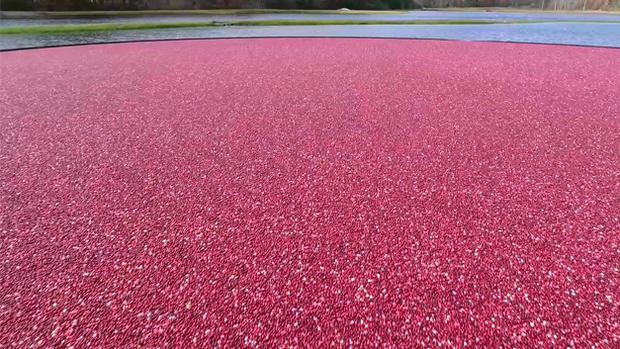Cranberry Growers Want To Destroy Crops To Prop Up Prices
BOSTON (AP/CBS) — Cranberry farmers have asked the federal government for permission to destroy a quarter of their crop in response to a glut that has kept prices low and growers operating in the red.
The Boston Globe reports that after struggling with an oversupply of the berries for nearly two decades, growers around the country are asking the U.S. Department of Agriculture for authorization to sell 75 percent of the supply and discard the rest.
If the government approves their request, farmers would hold back roughly 100 million pounds of cranberries.
The USDA estimates the cost to produce a barrel of cranberries is $35, but the average price last year was $31.50.
Cranberries are a cash crop in Massachusetts.
"For many of our growers, they're struggling to hold onto their farms," said Brian Wick, head of the Cape Cod Cranberry Growers Association. "It's the number one agricultural food crop in the state so it's very important."
But for some of the 375 cranberry growers in Massachusetts, times are tough, with a third of them earning less than it costs to grow the tart berries.
"We are almost at a break-even point right now, we may, we're teetering either way," said Rob Rubino, manager of Piney Wood Cranberries.
Rubino and other growers are asking the USDA for what's called a 'marketing order' to allow farmers and manufacturers to dispose of the equivalent of 25 percent of this year crop in hopes of bringing supply and demand into alignment.
"If you get into one of these cycles and you just can't break it, this is a mechanism that's been in place by congress basically, allowing us to do it," Wick said.
The problem is that there's a great demand for dried cranberries but for the juice concentrate that comes from the berry, demand for that is flat. The result is too much supply.
The USDA allowed a cranberry reduction last year and allows it for other crops.
"There are some commodities out there that, every year, they throw away a certain percentage of what is grown in order to keep the supply-demand in better alignment," Wick said.
The USDA did not respond when WBZ asked when a decision would be made.
(© Copyright 2018 CBS Broadcasting Inc. All Rights Reserved. The Associated Press contributed to this report.)




